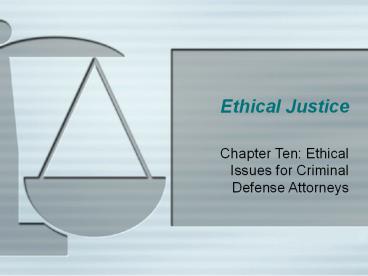Ethical Justice - PowerPoint PPT Presentation
Title:
Ethical Justice
Description:
Ethical Justice Chapter Ten: Ethical Issues for Criminal Defense Attorneys Ethical Justice Chapter Ten: Ethical Issues for Criminal Defense Attorneys Ethical Issues ... – PowerPoint PPT presentation
Number of Views:279
Avg rating:3.0/5.0
Title: Ethical Justice
1
Ethical Justice
- Chapter Ten Ethical Issues for Criminal Defense
Attorneys
2
Ethical Issues for Criminal Defense Attorneys
- This chapter considers the major ethical issues
and question peculiar to criminal defense
attorneys as they represent their clients. - The following ethical issues are considered
- The right to counsel
- The presumption of innocence and
- Ethical issues that occur prior to and during
trial.
3
The Right to Counsel
- Criminal defendants have a constitutionally
guaranteed right to legal representation. - This is guaranteed by the 6th Amendment to the
United States Constitution. - When a criminal defendant cannot afford a legal
representative, the state must provide one for
them to ensure that they are receiving impartial
legal advice. - Criminal defense attorneys must be capable of,
and willing to, represent anyone accused of a
crime.
4
The Right to Counsel
- There are four primary types of criminal defense
attorneys in the United States - Legal aid attorneys
- Those who volunteer to represent or assist
indigent criminal defendants, usually part of a
non-profit organization. - Public defenders
- Attorneys funded by the county, state, or federal
government to provide representation to indigent
defendants, as required by the U.S. Constitution.
5
The Right to Counsel
- Appointed counsel
- Private defense attorneys appointed by the court
to represent indigent defendants, often at a
fixed or hourly rate. - Private attorneys
- Represent those criminal defendants who can
afford to pay for their own attorney, and dont
qualify as indigent. This involves a contract for
a flat fee or an hourly rate.
6
The Right to Counsel
- Regardless of their employment situation, the
criminal defense attorney serves as an advocate
for the criminal defendant. They must - Shepherd the defendant through the legal process
- Inform them of their rights and scrupulously
protect them - And represent their will in the courtroom.
7
The Presumption of Innocence
- A fundamental virtue of the criminal justice
system in the United States is that all criminal
defendants are presumed innocent. The presumption
of innocence places the burden of proving
criminal guilt entirely on the government. - The state must prove a defendants guilt beyond a
reasonable doubt - The defense has a lower evidentiary threshold and
must only provide the existence of a reasonable
doubt to obtain an acquittal.
8
Ethical Issues with Clients
- Avoiding Conflicts of Interest
- A conflict of interest occurs when a person or an
agency has competing or incongruent loyalties,
because of their need to satisfy multiple roles,
duties, or obligations. Examples include - Situations in which the defense attorney has
important knowledge relating to the facts and
evidence underlying the charges against their
client, and is going to be called as a witness - When the defense attorney is implicated in
criminal activity, either in relation to the
charges against the client or by the same
prosecutors office - Representation of one co-defendant against the
interests of another
9
Ethical Issues with Clients
- Confidentiality and the Attorney-Client Privilege
- The principle of confidentiality is a fundamental
principle in the client-lawyer relationship is
that, in the absence of the client's informed
consent, the lawyer must not reveal information
relating to the representation.
10
Ethical Issues with Clients
- The attorney-client privilege is a legal
entitlement intended to facilitate truthful
communication and fully informed advocacy by a
defendants legal advisors. - The privilege extends to work-product notes,
observations, thoughts or research produced by
the attorney, and such material is protected from
discovery processes. - If the client provides their attorney with
physical evidence, or information regarding how
to find or retrieve it, that communication is
protected under the privilege. - If the client asks the attorney to put them on
the stand and makes it clear that they intend to
lie, the attorney has an obligation to prevent
it.
11
Ethical Issues with Clients
- Improper Sexual Relations and Couch Fees
- Unless the attorney has a prior sexual
relationship with an individual, it is generally
considered unethical to initiate or otherwise
engage in a sexual relationship with a client. - This prohibits a couch fee a lawyer cannot
solicit or accept sexual relations as payment of
fees or condition the representation of a client
or prospective client or the quality of such
representation on the client having sex with the
lawyer.
12
Pre-Trial Ethical Issues
- Pre-trial ethical issues include the following
- Reading the case file
- Competence and qualifications
- Resources and caseload and
- Plea deals
13
Ethical Issues at Trial
- In the courtroom, criminal defense attorneys have
an obligation to conduct themselves in
professional and honorable fashion. This includes
avoiding misconduct. - The ethical defense attorney also has an
obligation to avoid ineffective assistance of
counsel referring to conduct that undermines
the proper functioning of the adversarial process
to the extent that the trial cannot be relied on
as having produced a just result. - Ineffective assistance of counsel can result in
reversible error an error that is so harmful to
justice that it requires some or all of the
elements of a conviction to be overturned these
reversals are submitted for reconsideration by
the court, if not retrial.






























